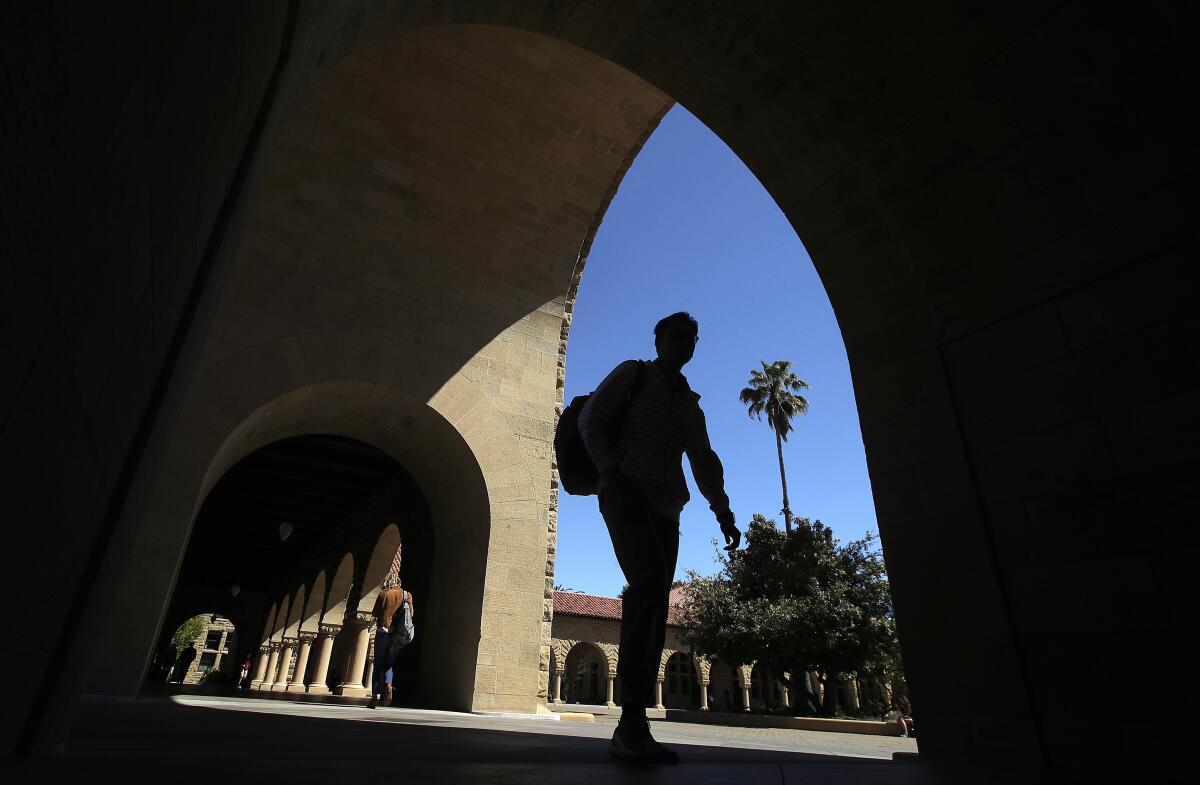Stanford employee arrested for allegedly lying about sexual assault on campus

A 25-year-old woman was arrested Wednesday for allegedly lying about being sexually assaulted while working at Stanford University, according to prosecutors.
The woman later admitted to prosecutors that she made up the false claims because she was angry with a co-worker.
Jennifer Gries of Santa Clara claimed she was raped twice while working at Stanford and told investigators that her attacker was a 6-foot man in his 20s and was Black, according to the Santa Clara County district attorney’s office.
Gries was charged with felony perjury and inducing false testimony, a misdemeanor, according to prosecutors.
Dist. Atty. Jeff Rosen called the crime “rare and deeply disturbing.”
“Our hearts go out to the falsely accused,” Rosen said in a written statement. “Our hearts go out to students who had to look over their shoulders on their way to class. Our hearts go out to legitimate sexual assault victims who wonder if they will be believed.”
Both incidents sparked campus-wide alerts to students and staff about a possible serial rapist on campus.
In August, Gries told a nurse at the Valley Medical Center that she was approached by a man as she was walking to her car. The man pinned her to the ground in a restroom and raped her, according to an investigator’s report that accompanied the charging documents.
Gries agreed to be examined at the hospital for any male DNA left by the attacker and the samples were placed into a sexual assault forensic evidence kit.
In October, Gries claimed she was raped again while she was working in a front office at the university and forced into a basement storage closet. She described the same attacker to a nurse at Stanford Hospital.
Each time, Gries declined to speak with law enforcement. When a detective with the Stanford Department of Public Safety tried to interview her, Gries refused to provide any additional details and only said that she knew the person who raped her, according to the report.
Gries was surprised a community alert was sent out to the campus about her first attack, an investigator’s report said. She continued to ask the detective questions about how the rapes would be investigated and what would happen to the sexual assault forensic evidence kit, according to the report. She also asked if there were any witnesses, prosecutors said.
On two separate occasions, Gries signed an application to receive benefits as a crime victim with the California Victim Compensation Board, according to authorities.
Forensic investigators rushed to examine the evidence taken from Gries, but there was no male DNA detected from the samples.
Investigators learned that in March 2022, Gries made a sexual harassment complaint against a coworker who fit the description of the person who she said attacked her. That male co-worker’s job location matched the areas where she claimed she was attacked, investigators said.
The work complaint was found to be unproven and Gries was reassigned to work in another area. But Gries told a friend who also worked at the university that she was romantically involved with the man whom she made the complaint against, according to investigators. Gries claimed the man sexually assaulted her and that she became pregnant with his twins, which investigators found not to be true, prosecutors said.
In text messages with her friend, Gries said she was upset with the man and, according to the charging documents, she wrote, “I need to start standing up for myself…. I am so annoyed…. I’m coming up with a plan. That way he’s s— his pants for multiple days.”
When a detective met with Gries in November, she became flustered after the detective asked if the man named in the work-related complaint could be ruled out as a suspect from the two sexual assaults, investigators said.
In January, Gries admitted to an investigator with the district attorney’s office that she lied about the sexual assaults, prosecutors said. She then wrote an apology letter to the man who was named in her worked-related complaint and the target of her false sexual assault reports, according to investigators.
The university reported spending more than $300,000 during its investigation and hired extra security around the campus. Hundreds of students marched on campus after Gries’ second rape claim, demanding that the university do more to address the problem.
The man who was the target of Gries’ false claims was interviewed by investigators and said the worked-related complaint that accused him of sexual assault scarred him. At the time, he was caring for his ill mother who later died, investigators said.
He denied sexually assaulting Gries and provided investigators with an alibi, investigators said in their report.
He also agreed to have his mouth swabbed for a DNA sample. He was emotional and teary-eyed, according to investigators, and explained how the whole episode was emotionally and physically traumatic.
He told investigators, “This is disgusting. I don’t feel human. I don’t feel human at all.”
More to Read
Sign up for Essential California
The most important California stories and recommendations in your inbox every morning.
You may occasionally receive promotional content from the Los Angeles Times.










